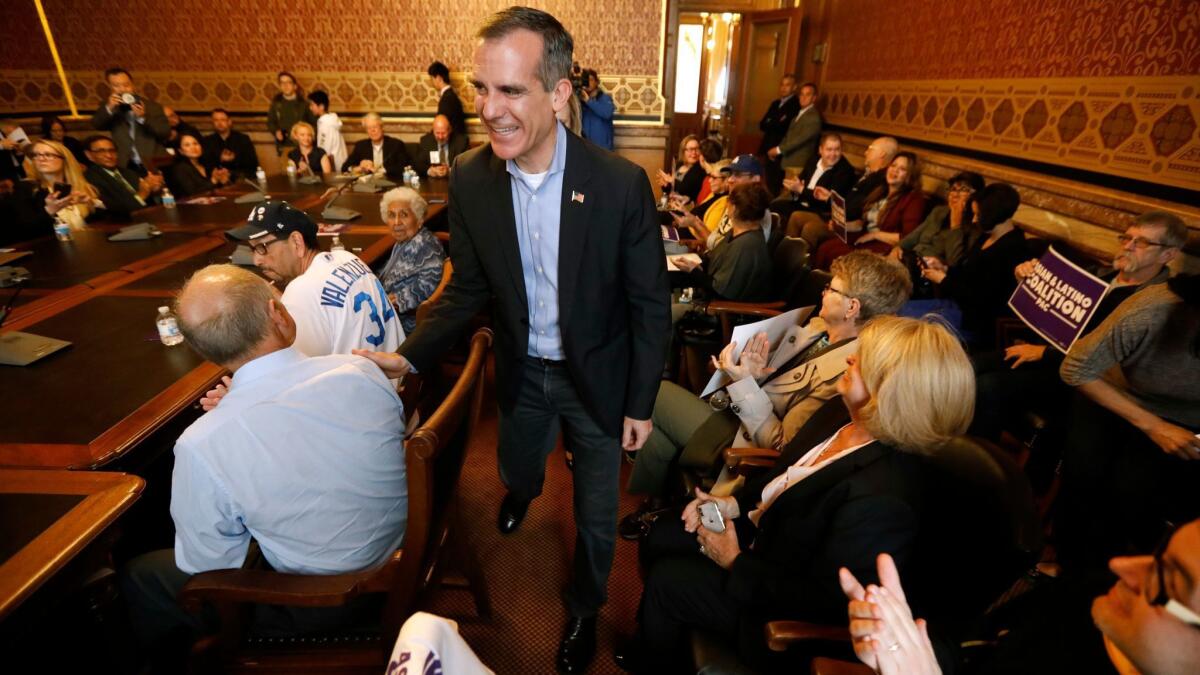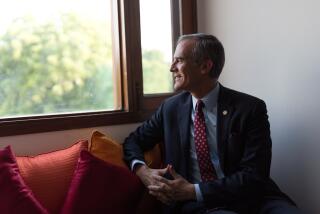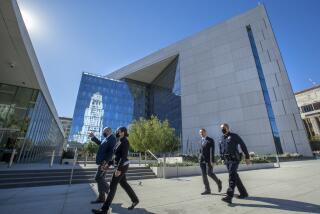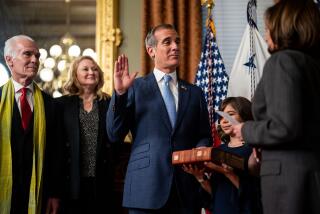L.A. Mayor Eric Garcetti on running for president, not running and his favorite jazz pianists

- Share via
Reporting from Des Moines, iowa — Los Angeles Mayor Eric Garcetti brought his all-but-announced 2020 presidential candidacy to Iowa on Friday, visiting for two days of stumping in the state that traditionally casts the first ballots of the presidential campaign.
Having called on New Hampshire, South Carolina and Nevada, Garcetti has now completed the circuit of early-voting states, though he insists a final decision on running won’t come until next year.
The Democrat not only starts the race as an extreme long shot — even just to win his party’s nomination — but he also is bucking history: No mayor has ever gone straight from City Hall to the White House.
After breakfast Saturday morning with firefighters in a cafe on the east side of Des Moines, the Democratic hopeful sat for an interview about his presidential ambitions and, as an aside, music.
Some responses have been edited for length and clarity.
What was the precise moment you said to yourself, “You know what, I could be president. I could do that job”?
Look, I’ve worked closely with presidents, especially with President Obama, and I realized that what good leaders do at the national level is no different than what we do at the local level. Leadership is leadership, producing results is producing results.
I mean, I’m always intimidated in life about the next step and pleasantly surprised when I get there that, “Hey, human beings figured out a way to do this before, and I can too.” But I don’t have a precise moment.
I’ve always been a little scared by the next step in life. If that can keep you humble, don’t be scared and jump in.
Would you be running if Donald Trump wasn’t president?
No.
Is that because you think he’s changed the rules and the threshold for being elected president?
Oh, I think the old rules were dying out long before Trump was elected president. No African American had become president until one was.
What would dissuade you from running at this point?
Somebody else who checks the boxes that I can get behind. At the end of the day, it’s a very personal decision, for my family, for me, for my daughter. I’ve got a family that comes first and a city that I still want to finish the work for.
I know if I were to be president, I could maybe have a greater impact on helping Los Angeles than I can even today because some of the frustrations, from homelessness to the environment, we have no help [on] from Washington.
Eric Garcetti, presidential long shot, journeys to Iowa, the land of dreams »
So those things will all factor in. I feel a real responsibility to my city, my family. And I always look for somebody else. I never assume I’m the guy.
Check what boxes?
I’m like a voter. It’s a feeling for me. I don’t have boxes, and I don’t have an agenda. Elections are about a visceral feeling, especially presidential elections — of whether people can lead. I’d be looking for the same thing that a voter did.
You’re a mayor, you’re a dad, you’re exploring a run for president. How do you juggle those?
I work 18 hours a day almost every day and [weekends.] I prioritize my daughter and my wife. I either come home to tuck her into bed, or come home to have dinner … virtually every night. I didn’t run for governor partially because I didn’t want to be gone from home for a year. At the same time, I don’t want my daughter to grow up in an America that looks like this right now and that feels like this.
In good conscience, I have to balance my obligations to them, and the power that we all have as Americans and patriots right now to turn this tide. I don’t want her growing up thinking this is normal.
You’re a very private person when it comes to your personal life. How do you deal with the fishbowl of a presidential campaign?
I’m in what feels like a pretty transparent fishbowl as mayor. People see you at the market, people see you at the diner, people see you wherever you are, talk to you. You don’t shave, they’re taking selfies of you. You come back from your jog, they’re talking to you. I live in that world already right now.
The national stage amplifies that, but that’s my day-to-day reality and it’s part of what I love is that people know and can find me, knock on my door, can visit me during office hours. I’m meeting with somebody who is struggling with homelessness one hour and the head of state the next and everything in between, so I’m very comfortable in that space.
In a potentially large and varied Democratic field, what makes you uniquely qualified or suited to be president?
I leave that to others like you to analyze. I’m proud of the record we’ve built in Los Angeles and its applicability to the smallest town, the biggest city, all the local communities.
I think I bring a perspective that local communities are what make this country great, and they are the laboratories of democracy.
I think I bring the perspective of doing things, and having to do things. … I’m not just for raising the minimum wage, I did it. I’m not just for free community college, I’ve done it. I’m not just for middle-class jobs, I’ve produced them.
You’re an accomplished jazz pianist. Your three favorites?
Keith Jarrett. Oscar Peterson. Those are my first two, by far. Ahmad Jamal, probably the other one.
Why Keith Jarrett?
He just speaks to me. It’s how I play.
More to Read
Get the L.A. Times Politics newsletter
Deeply reported insights into legislation, politics and policy from Sacramento, Washington and beyond. In your inbox three times per week.
You may occasionally receive promotional content from the Los Angeles Times.











